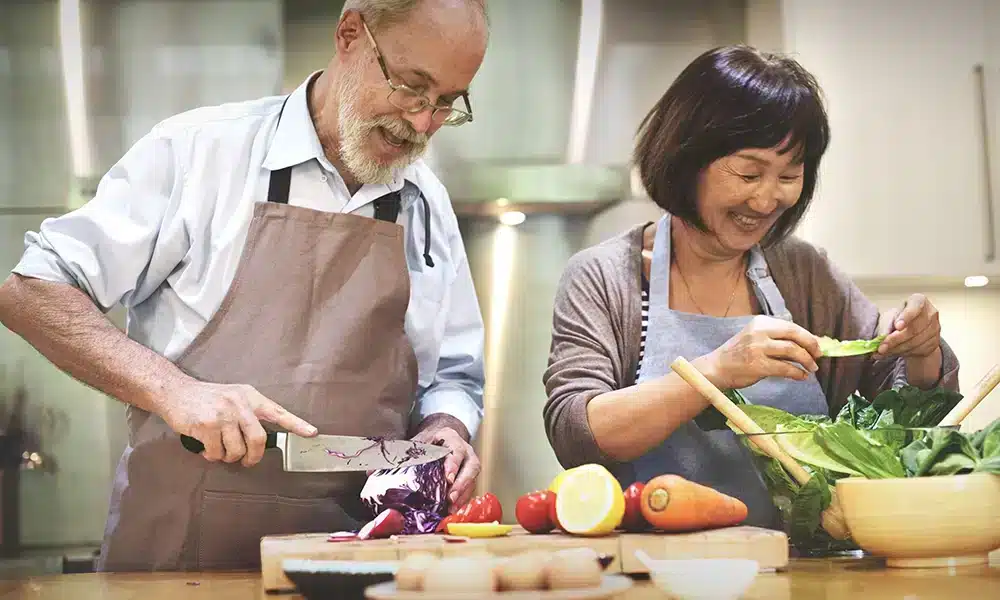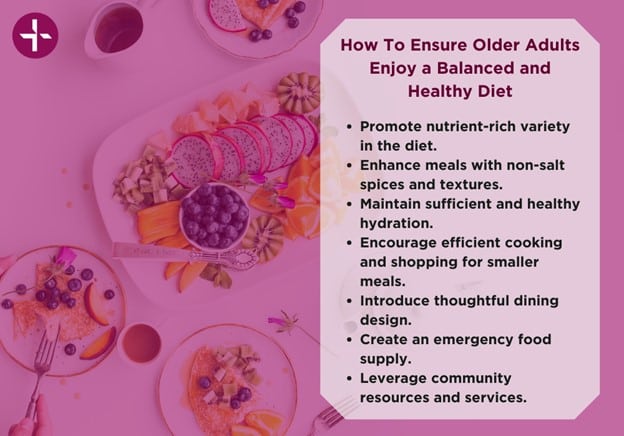Nutrition’s Role in Fall Prevention: Keeping Your Older Loved Ones Safe and Healthy
Falls among older adults are a major concern for families. These incidents are often linked to age-related muscle loss, frailty, polypharmacy, and various health conditions, including Parkinson’s disease, dementia, arthritis, cognitive decline, and vision impairment. These health issues often lead to physical and cognitive weakness, making older individuals more susceptible to slips and falls.
What drives home the importance of this connection is a stark statistic: those who have experienced falls are nearly twice as likely to be malnourished compared to their counterparts. In other words, poor nutrition is not just a standalone issue; it’s intricately intertwined with the risk of falls in older adults.
The seriousness of this situation becomes even more apparent when we consider the broader landscape of nutrition in Canada. Alarmingly, one-third of Canadian adults are at risk of poor nutrition, evident through skipped meals, substantial weight loss, or diets lacking in healthy food, such as fruits and vegetables.
Elderly adults, in particular, emerge as a vulnerable demographic. They possess distinct nutritional requirements, necessitating higher intakes of critical nutrients, including calcium, protein, and vitamin D. Neglecting these needs leads to rapid muscle loss, physical weakness, and an elevated risk of falls.
Taking proactive measures to ensure your older loved one receives adequate nutrition is a crucial step in fall prevention. Let’s delve into practical strategies for your older family member to enjoy a balanced diet, customized to their unique requirements.
Promote Good Nutrition In The Diet
As your loved one ages, it becomes vital to introduce a variety of healthy foods into their diet to provide essential nutrients. Encourage them to incorporate a broad spectrum of vegetables and fruits, including options like kale and carrots for their distinct health benefits. Whole grains like oats and wild rice, protein sources such as eggs, nuts, fish, beans, and lean meats, should also be part of their meals. Additionally, don’t overlook the significance of lower-fat dairy products, fortified soy alternatives, and vitamin D supplements, especially if they’re 51 or older.
Enhance Meals With Non-Salt Spices and Textures
If changes in their sense of taste have occurred, suggest experimenting with new spices and herbs to enhance the flavors of their dishes, reducing their reliance on salt. Varying textures and temperatures can also make meals more enjoyable. For softer textures, recommend blanching, steaming or stir-frying vegetables instead of serving them raw.
Maintain Sufficient and Healthy Hydration
Advise your older loved ones to maintain proper hydration by drinking regularly throughout the day, regardless of their perceived thirst. Water is a key factor to good nutrition and should be the primary choice over sugary beverages. However, if they don’t enjoy drinking water, encourage them to consume other more nutritious options like low-fat white milk, low-sodium soups, and fruits and vegetables.
Encourage Efficient Cooking and Shopping For Smaller Meals
Managing grocery shopping for a smaller household and meal preparation can be challenging. To make it more manageable, help them plan meals around their preferences, create organized shopping lists, and prioritize budget-friendly, nutritious choices. Consider utilizing senior discount days at local grocery stores and explore convenient options like online shopping, sharing quantities with a friend, or using delivery services.
Cooking for one or two people may seem daunting, especially if they’re accustomed to preparing meals for a larger family or aren’t the primary cook. Encourage them to cook when they have more energy and opt for simple recipes on tired days. Making larger portions to enjoy as leftovers or freeze for later can also simplify meal preparation.
Make Mealtime Easier
Small interventions in how you display meals can make a big difference. Consider assistive devices or simple modifications to allow your older loved ones to enjoy their meals as easily as possible. If someone has visual limitations, try using colored dishware or utensils. If they have arthritis or difficulty with their hands, consider adapted utensils to make their dining experience more successful. If someone has difficulties getting food onto their fork and is chasing their food around consider plates with raised ridges to prevent food from falling. These suggestions not only promote dignity but also make the dining experience easier, and allows them to consume a greater volume of their nutritious food.
Create An Emergency Food Supply
Ensure your older family member has a variety of non-perishable food items in their pantry to prepare meals during times when they can’t get to the store. Stock up on essentials healthy foods like peanut butter, skim milk powder, canned fruits and vegetables, pasta sauce, canned fish, beans, lentils, whole-grain pasta, rice, and oatmeal. The freezer can also be a valuable resource for storing whole-grain bread, lean meats, poultry, and frozen fruits and vegetables.
Leverage Community Resources and Services
Explore the resources available in the neighborhood to support your older family member’s dietary needs. These resources can include grocery store trips, meal delivery services, lunch clubs, cooking classes, and volunteer service centers that offer assistance with shopping. Such community options are essential in ensuring they have access to nutritious food and a supportive social network.
Making life safer and healthier for your older loved ones is as easy as sharing delicious, nutrient-packed meals together. Think of it as your special recipe for their well-being and fall prevention.
With these small changes, you’re not only creating delightful family moments but also building a safer and healthier future for your loved ones. Embrace these steps, and you’ll ensure they enjoy an active, fulfilling life without the worry of falls. It’s all about serving up the best ingredients for a happy and healthy journey together!







